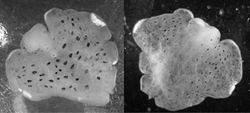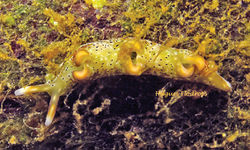Elysia cf nigropunctata
| Notice: | This page is derived from the original publication listed below, whose author(s) should always be credited. Further contributors may edit and improve the content of this page and, consequently, need to be credited as well (see page history). Any assessment of factual correctness requires a careful review of the original article as well as of subsequent contributions.
If you are uncertain whether your planned contribution is correct or not, we suggest that you use the associated discussion page instead of editing the page directly. This page should be cited as follows (rationale):
Citation formats to copy and paste
BibTeX: @article{Yonow2012ZooKeys197, RIS/ Endnote: TY - JOUR Wikipedia/ Citizendium: <ref name="Yonow2012ZooKeys197">{{Citation See also the citation download page at the journal. |
Familia: Plakobranchidae
Genus: Elysia
Name
Elysia nigropunctata (Pease, 1871) cf. – Wikispecies link – Pensoft Profile
- ? Pterogasteron nigropunctatus Pease, 1871: 304, pl. 22 fig. 2 (Tahiti).
- Elysia sp. 11. – http://seaslugs.free.fr/nudibranche/a_intro.htm (La Réunion, Mauritius, and Mayotte); http://www.seaslugforum.net/find/elyssp11 (Tanzania, Madagascar, South Africa + W Pacific).
- Elysia sp. 12. – http://www.seaslugforum.net/showall/elyssp12 (French Polynesia).
- non Elysia nigropunctata. – Bergh 1873: 80, pl. 9 fig. 7, pl. 11 figs. 7-12; Risbec 1928[1]: 284, pl. 12 fig. 9.
Material
Seychelles: 20 × 5 mm (PK-HH, “10 mm when parapodia are opened”), Whale Rock, on coral rubble, 26 April 1992, leg. P Kemp; numerous photographs from La Réunion, Mauritius, and Mayotte http://seaslugs.free.fr/nudibranche/a_intro.htm.
Description
Body pale green with ocellated black spots and orange patches along edges of parapodia where they were thrown into three permanent folds. Rhinophores marbled green with white pigment dorsally, creamy orange submarginal band, and white distal end. Oral tentacles tipped with white.
The single specimen is well preserved, with the parapodia opened completely. Dorsally, there are large black ovate spots (oval along the horizontal axis) on inner surfaces of parapodia and body. Edges of parapodia scalloped in three places, containing opaque white granular pigment spots along the margin (Fig. 4A), presumably the orange marginal pigment in life. The pericardium is elongated, triangular anteriorly and squared posteriorly, with only two un-branched vessels posteriorly. Ventrally, the foot and head are bilobed; there are fewer smaller spots on the foot and more larger spots on the outer surfaces of the parapodia (Fig. 4B).
Remarks
This species is recognisable, as evidenced by the internet discussions (http://www.seaslugforum.net/find/elyssp11) and is most probably Pease’s species, described from Tahiti. The many photographs on the internet show slight variations only, and it is remarkable that it has not been recorded before. This is not only the first record for the Indian Ocean, but the first published record since the species was described in 1861. Another specimen measuring 40 mm from Madagascar is lodged in the Natural History Museum, London (NHMUK 20010521, leg. Lindsey Warren) but was not examined by this author.
Taxon Treatment
- Yonow, N; 2012: Opisthobranchs from the western Indian Ocean, with descriptions of two new species and ten new records (Mollusca, Gastropoda) ZooKeys, 197: 1-130. doi
Other References
- ↑ Risbec J (1928) Contribution a l’étude des Nudibranches Néo-Calédoniens. Faune des Colonies Françaises 2: 1-328.
Images
|

